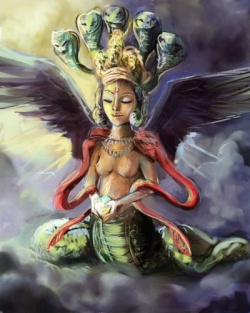Serpent or Dragon Spirits
The Collation of Theosophical Glossaries, Compiled by Scott J. Osterhage, has all of this on Nagas:
TG Naga (Sk). Literally "Serpent". The name in the Indian Pantheon of the Serpent or Dragon Spirits, and of the inhabitants of Patala, Hell. But as Patala means the antipodes, and was the name given to America by the ancients, who knew and visited that continent before Europe had ever heard of it, the term is probably akin to the Mexican Nagals the (now) sorcerers and medicine men. The Nagas are the Burmese Nats, serpent-gods, or "dragon demons". In Esotericism, however, and as already stated, this is a nick-name for the "wise men" or adepts. In China and Tibet, the "Dragons" are regarded as the tutelary deities of the World, and of various spots on the Earth, and the word is explained as meaning adepts, yogis, and narjols. The term has simply reference to their great Knowledge and Wisdom. This is also proven in the ancient Sutras and Buddha's biographies. The Naga is ever a wise (wo)man, endowed with extraordinary magic powers, in South and Central America as in India, in Chaldea as also in ancient Egypt. In China the "worship" of the Nagas was widespread, and it has become still more pronounced since Nagarjuna (the "great Naga", the "great adept" literally), the fourteenth Buddhist Patriarch, visited China. The "Nagas" are regarded by the Celestials as "the tutelary Spirits or gods of the five regions or the four points of the compass and the centre, as the guardians of the five lakes and four oceans" (Eitel). This, traced to its origin and translated esoterically, means that the five continents and their five root-races had always been under the guardianship of "terrestrial deities", i.e., Wise Adepts. The tradition that Nagas washed Gautama Buddha at his birth, protected him and guarded the relics of his Body when dead, points again to the Nagas being only wise men, Arhats, and no monsters or Dragons. This is also corroborated by the innumerable stories of the Conversion of Nagas to Buddhism. The Naga of a lake in a forest near Rajagriha and many other "Dragons" were thus converted by Buddha to the good Law.
WG Naga, a serpent; a tree; a mountain; the sun; the number seven; a Symbol of Wisdom; an Initiate. GH Naga The word means a snake, especially a cobra; but in the Mahabharata it refers to a race of beings inhabiting Patala, the daughter of whose king, Ulupi married Arjuna. "But as Patala means the antipodes, and was the name given to America by the ancients, who knew and visited that continent before Europe had ever heard of it, the term is probably akin to the Mexican Nagals the (now) sorcerers and medicine men." (Theosophical Glossary, H. P. Blavatsky, p. 222) One myth relates that the Nagas were the offspring of the Rishi Kasyapa (the son of Marichi q.v.). Regarding this H. P. Blavatsky wrote: "What is the fable, the genealogy and origin of Kasyapa, with his twelve wives, by whom he had a numerous and diversified progeny of Nagas (serpents), reptiles, birds, and all kinds of living things, and who was thus the father of all kinds of Animals, but a veiled record of the order of Evolution in this round?" (Secret Doctrine, II, p. 253) Another tale represents the Nagas as a semi-divine race (the race of Kadru) inhabiting the waters, or the city of Bhogavati situated under the Earth: they are fabled to possess a human face with serpent-like lower extremities. Ananta (q.v.) is king of the Nagas. In The Secret Doctrine, the word Naga stands for a Serpent of Wisdom, a full Initiate -- the serpent has ever been used in Occultism as the Symbol of immortality and Wisdom. "In the Secret Doctrine,, the first Nagas -- beings wiser than Serpents -- are the 'Sons of Will and Yoga,' " (Secret Doctrine,, II, p. 181). "Some of the descendants of the primitive Nagas, the Serpents of Wisdom, peopled America, when its continent arose during the palmy days of the great Atlantis," (Secret Doctrine, II, p. 182). (Bhagavad-Gita, W. Q. Judge, p. 75)
